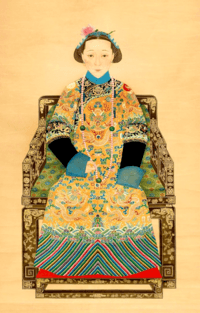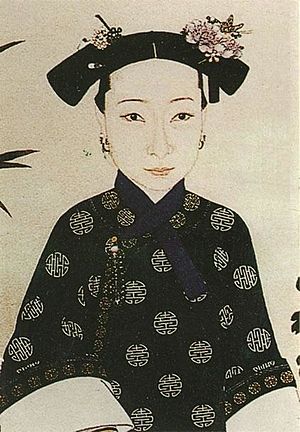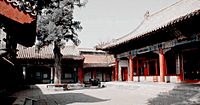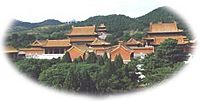Empress Dowager Ci'an facts for kids
Quick facts for kids Empress Xiaozhenxian |
|||||
|---|---|---|---|---|---|

Portrait of Empress Dowager Ci'an
|
|||||
| Empress consort of the Qing dynasty | |||||
| Tenure | November/December 1852 – 22 August 1861 | ||||
| Predecessor | Empress Xiaoquancheng | ||||
| Successor | Empress Xiaozheyi | ||||
| Empress dowager of the Qing dynasty | |||||
| Tenure | 22 August 1861 – 8 April 1881 | ||||
| Predecessor | Empress Dowager Kangci | ||||
| Successor | Empress Dowager Cixi | ||||
| Born | 12 August 1837 (道光十七年 七月 十二日) Liuzhou |
||||
| Died | 8 April 1881 (aged 43) (光緒七年 三月 十日) Zhongcui Palace, Forbidden City |
||||
| Burial | Ding Mausoleum, Eastern Qing tombs | ||||
| Spouse |
Xianfeng Emperor
(m. 1852; died 1861) |
||||
|
|||||
| House | Niohuru (鈕祜祿) (by birth) Aisin Gioro (by marriage) |
||||
| Father | Muyang'a | ||||
| Mother | Lady Giyanggiya | ||||
| Empress Dowager Ci'an | |||||||
|---|---|---|---|---|---|---|---|
| Chinese name | |||||||
| Traditional Chinese | 孝貞顯皇后 | ||||||
| Simplified Chinese | 孝贞显皇后 | ||||||
|
|||||||
| Manchu name | |||||||
| Manchu script | ᡥᡳᠶᠣᠣᡧᡠᠩᡤᠠ ᡵᡝᡴᡩᡠᠨ ᡳᠯᡝᡨᡠ ᡥᡡᠸᠠᠩᡥᡝᠣ |
||||||
| Romanization | hiyoošungga jekdun iletu hūwangheo | ||||||
Empress Xiaozhenxian (born August 12, 1837 – died April 8, 1881) was a powerful woman in China's history. She belonged to the Manchu Niohuru clan. She was the main wife and empress of the Xianfeng Emperor. From 1852 until her husband's death in 1861, she was the Empress of the Qing dynasty. After his death, she became known as Empress Dowager Ci'an.
As an empress dowager, she was one of the most important people in the royal family. She and Empress Dowager Cixi ruled China as regents. They helped guide two young emperors: Zaichun, the Tongzhi Emperor and later Zaitian, the Guangxu Emperor. Ci'an was officially more important than Cixi. However, Ci'an was a quiet person and usually stayed out of politics. She made decisions about family matters. Empress Dowager Cixi, on the other hand, handled most of the government's important work.
Many people believed Empress Dowager Ci'an was a very kind and calm person. They thought she treated everyone well. The Xianfeng Emperor also respected her greatly. But some historians have a different idea. They say Ci'an was more interested in enjoying life in the Forbidden City than in hard work and government.
Contents
Life Story of Empress Ci'an
Her Family Background
Empress Xiaozhenxian's personal name is not known from history.
- Her father was Muyang'a. He was an official in Guangxi and held a high title.
- Her mother was Lady Giyanggiya.
- She had one brother named Guangke.
- She also had one sister.
Her family was related to Eidu, a famous general who served Nurhaci. Nurhaci was the founder of the Qing dynasty.
Becoming an Empress
The future Empress Xiaozhenxian was born on August 12, 1837. This was during the reign of the Daoguang Emperor.
When the Daoguang Emperor died in 1850, his son Yizhu became the Xianfeng Emperor. The Xianfeng Emperor's first wife had died. So, a new empress needed to be chosen.
In 1851, Lady Niohuru was chosen to be one of the Xianfeng Emperor's consorts. Her position in the palace quickly grew.
- On June 14, 1852, she became "Concubine Zhen."
- Later in June or early July 1852, she was promoted to "Noble Consort Zhen."
- On July 24, 1852, she was officially named the Empress. As Empress, she was in charge of the emperor's many wives.
The Empress did not have any children of her own. On April 27, 1856, another of the Xianfeng Emperor's consorts, Concubine Yi, gave birth to the emperor's first son, Zaichun. Concubine Yi later became Empress Dowager Cixi. Even though Zaichun was not her birth son, the Empress was considered the mother of all the emperor's children. She was responsible for raising them and deciding their punishments.
Ruling as Regent
On August 22, 1861, the Xianfeng Emperor died. He had fled to a palace outside Beijing during the Second Opium War. His only living son, Zaichun, was just five years old. Zaichun became the Tongzhi Emperor.
Before he died, the Xianfeng Emperor chose eight officials to rule until his son was old enough. However, Noble Consort Yi (the Tongzhi Emperor's birth mother) also wanted to rule. The Empress first agreed with the eight officials. But Noble Consort Yi convinced her to change her mind.
In November 1861, with help from Prince Gong, the Empress and Noble Consort Yi took control. This event is known as the Xinyou Coup. They removed the eight officials from power.
Noble Consort Yi became "Holy Mother, Empress Dowager" and was given the name "Cixi." This is why she is known as "Empress Dowager Cixi." The Empress, as the main wife of the dead emperor and the new emperor's official mother, also became an empress dowager. She was called "Mother Empress, Empress Dowager" and given the name "Ci'an." This title meant she was more important than Cixi.
Because Ci'an lived in the eastern part of the Forbidden City, people called her the "East Empress Dowager." Cixi, who lived in the western part, was called the "West Empress Dowager."
The two empresses dowager became joint rulers for the Tongzhi Emperor. Women were not allowed to be seen during court meetings. So, they sat behind a curtain while the child emperor was present. Even though Ci'an was officially more important, she rarely got involved in politics. Cixi was the one who truly controlled the government. Both Ci'an and Cixi studied history to learn about ruling. They also attended lectures from scholars.
Many people believe Cixi held the real power. However, for the first 20 years, Cixi could not make decisions alone. Every new rule needed approval from both empresses dowager.
The Case of An Dehai
The years after the Xianfeng Emperor's death were peaceful. This time was called the Tongzhi Restoration. The treasury started to grow again. Empress Dowager Ci'an was not often mentioned during this time. Her most notable action was in 1869.
An Dehai was a court eunuch and a close helper of Empress Dowager Cixi. He went on a trip to buy special robes for Cixi. While traveling, he used his power to demand money from people and cause trouble. The Governor of Shandong, Ding Baozhen, reported An Dehai's actions to the court.
Empress Dowager Ci'an heard about it. She wrote an order for An Dehai's arrest and execution. She said he had left Beijing without permission and done illegal things. An Dehai was executed on September 12, 1869. This was unusual for Ci'an, and it is said to have upset Empress Dowager Cixi. Some say Prince Gong encouraged Ci'an to make this strong decision.
The Emperor's Marriage and Death
In 1872, Ci'an and Cixi agreed it was time for the Tongzhi Emperor to marry. Ci'an, as the highest-ranking woman, chose the new empress. She chose a girl from the Mongol Alute clan, who later became Empress Xiaozheyi. Lady Alute's mother was Ci'an's cousin.
After the wedding, both empresses dowager stepped down as regents. But they had to start ruling again in December 1874 when the Tongzhi Emperor became ill. In January 1875, the Tongzhi Emperor died. Empress Dowager Cixi's nephew, Zaitian, became the new emperor, the Guangxu Emperor. Since he was also young, the two empresses dowager became regents once more.
Later Years and Death
In the late 1870s, Empress Dowager Cixi became sick. So, Empress Dowager Ci'an had to rule by herself. During this time, she dealt with a war against the Russian Empire over the Ili region. China regained control of the area in 1877. The conflict ended with a peace treaty in 1881.
Ci'an rarely left the Forbidden City. But she did visit the imperial tombs to honor her husband and ancestors. In 1880, at the Eastern Qing tombs, Ci'an took the lead in all ceremonies. She stood in the central position at the Xianfeng Emperor's tomb. She told Cixi to stand on the right, reminding her that Cixi was only a concubine when the emperor was alive.
Her Sudden Passing
On April 8, 1881, Empress Dowager Ci'an suddenly became ill during a court meeting. She was taken to her rooms and died within a few hours. Her sudden death surprised many people.
Although she seemed healthy, Ci'an had been seriously ill at least three times before. She had a history of what seemed to be strokes. Her official cause of death was a sudden stroke. Doctors who have studied her medical records believe she died from a brain hemorrhage.
Years after her death, rumors spread that Empress Dowager Cixi had poisoned her. However, there is no real proof for these claims. Cixi herself was often ill around that time, making it unlikely she was involved.
One popular rumor says that the Xianfeng Emperor gave Ci'an a secret order before he died. This order supposedly allowed Ci'an to remove Cixi if needed. The rumor claims Ci'an showed Cixi the order and burned it to show her trust. She then died mysteriously that same day. However, this story is not supported by facts.
Her long official name, given after her death, is:
- "Empress Xiao-zhen Ci'an Yuqing Hejing Chengjing Yitian Zuosheng Xian"
This long name can still be seen on her tomb today. The shorter form of her name is:
- "Empress Xiaozhenxian"
Empress Dowager Ci'an was buried in the Eastern Qing tombs, east of Beijing. She was not buried next to her husband. Instead, she was laid to rest in the Puxiangyu Eastern Ding Mausoleum. Empress Dowager Cixi built her own larger tomb nearby.
How People Saw Her
Many people thought Empress Dowager Ci'an was a very kind and calm person. They believed she was never angry and treated everyone well. Both the Tongzhi Emperor and Guangxu Emperor liked Ci'an more than Cixi. People thought her good nature was no match for Cixi, who was clever and managed to push Ci'an aside. This idea is still popular in China.
However, some historians have a different view. They say Ci'an was more interested in enjoying herself than in governing. They believed she did not care much for hard work. Empress Dowager Cixi, on the other hand, was seen as smart and willing to work hard to gain power. She faced the many problems China had at the time. The truth might be somewhere in the middle. Some even say Ci'an could show temper and willpower. The idea of Ci'an being a simple, nice girl was perhaps made stronger by some writers to make Cixi seem worse.
Katherine Carl, who spent time with Empress Dowager Cixi, described Ci'an as the "Literary Empress." She said Ci'an focused on reading and writing. While Cixi handled state affairs, Ci'an lived like a student. She was a talented writer and even helped check essays for high honors at the University of Beijing. Carl believed Ci'an and Cixi lived together peacefully and respected each other. Their friendly relationship ended with Ci'an's death in 1881.
Titles She Held
- During the reign of the Daoguang Emperor (1820–1850):
- Lady Niohuru (from August 12, 1837)
- During the reign of the Xianfeng Emperor (1850–1861):
- Imperial Concubine Zhen (from June 14, 1852)
- Noble Consort Zhen (from June/July 1852)
- Empress (from November/December 1852)
- During the reign of the Tongzhi Emperor (1861–1875):
- Empress Dowager Ci'an (from August 22, 1861)
- During the reign of the Guangxu Emperor (1875–1908):
- Empress Xiaozhenxian (from May/June 1881)
Images for kids
See also
 In Spanish: Ci'an para niños
In Spanish: Ci'an para niños
 | Sharif Bey |
 | Hale Woodruff |
 | Richmond Barthé |
 | Purvis Young |






